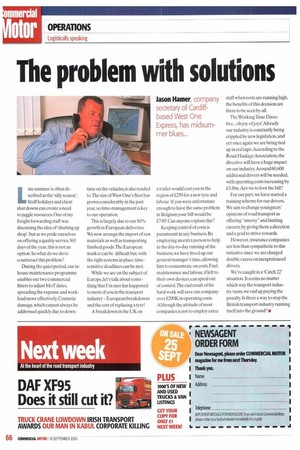The problem with solutions
Page 66

If you've noticed an error in this article please click here to report it so we can fix it.
Late summer is often described as the 'silly season'. Staff holidays and client shut downs can create a need to juggle resources. One of my freight forwarding staff was discussing the idea orshutting up shop', but as we pride ourselves on offering a quality service 365 days of the year. this is not an option. So what do we do to counteract this problem?
During the quiet period, our inhouse maintenance programme enables our two commercial fitters to adjust MoT dates, spreading the expense and workload more effectively. Cosmetic damage, which cannot always be addressed quickly due to down time on the vehicles, is also tended to.The size of West One's fleet has grown considerably in the past year, so time-management is key to our operation.
This is largely due to our 80% growth in European deliveries. We now arrange the import of raw materials as well as transporting finished goods.The European market can be difficult but, with the right systems in place, timesensitive deadlines can be met.
While we are on the subject of Europe, let's talk about something that I'm sure has happened to most of you in the transport industry —European breakdowns and the cost of replacing a tyre!
A breakdown in the UK on a trailer would cost you in the region of 1250 for a new tyre and labour. If you were unfortunate enough to have the same problem in Belgium your bill would be £700! Can anyone explain this?
Keeping control of costs is paramount in any business. By employing an extra person to help in the day-to-day running of the business, we have freed up our general manager's time, allowing him to concentrate on costs. Fuel, maintenance and labour,if left to their own devices can spiral out of control.The end result of his hard work will save our company over 1200K in operating costs. Although the attitude of most companies is not to employ extra staff when costs are running high, the benefits of this decision are there to be seen by all.
The Working Time Directive...oh joy of joys! Already our industry is constantly being crippled by new legislation, and yet once again we are being tied up in red tape.According to the Road Haulage Association, the directive will have a huge impact on our industry. Around 60,600 additional drivers will be needed, with operating costs increasing by f..3.8bn.Are we to foot the bill?
For our part, we have started a training scheme for our drivers. We aim to change youngsters' opinions of road transport as offering "unsexy" and limiting careers, by giving them a direction and a goal to strive towards.
However, insurance companies are less than sympathetic to this initiative since we are charged double excess on inexperienced drivers.
We're caught in a 'Catch 22' situation. It seems no matter which way the transport industry turns, we end up paying the penalty. Is there a way to stop the British transport industry running itself into the ground? •




























































































































































































